From the archives | The Clarence Thomas vote: What Senators said
- Oops!Something went wrong.Please try again later.
- Oops!Something went wrong.Please try again later.
This story originally published Oct. 16, 1991. It is being republished as part of the commemoration of USA TODAY's 40th anniversary Sept. 15, 2022.
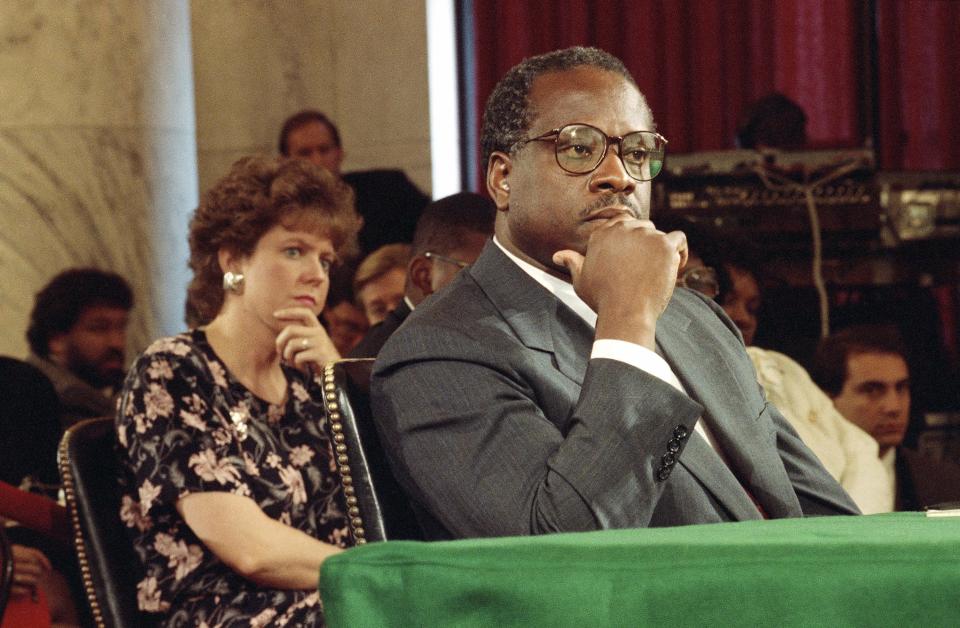
Tuesday's 52-48 Senate vote to confirm Clarence Thomas was the most closely watched vote on a Supreme Court nominee in history. In the end, 41 Republicans and 11 Democrats backed Thomas. Some senators cited the Anita Hill allegations in their final decision; others said their choice was based on other factors. Here is what each member had to say about his or her vote:
Majority Leader George Mitchell, (D-Maine)
No: "The confirmation process has become uncomfortable and demeaning; it must be changed. Perhaps something good may yet come from this terrible episode.''
Minority Leader Robert Dole, (R-Kansas)
Yes: "The Senate's not going to fall apart over this vote. ... After all is said and done ... it boils down to a question of credibility. This is not a referendum on sexual harassment.''
Brock Adams, (D-Washington)
No: President should pick "the best, rather than well-packaged but undistinguished nominees who fill a right-wing agenda."
Daniel Akaka, (D-Hawaii)
No: Though he decided earlier to oppose, says he found Anita Hill to be "sincere'' and "credible'' during weekend Senate testimony.
Max Baucus, (D-Montana)
No: Cited Thomas' views, experience; said while American Bar Association panel rated him "qualified,'' two said "unqualified.''
Lloyd Bentsen, (D-Texas)
No: Opposed Thomas' "minimum qualifications'' for reasons unrelated to Hill's charges. "There are far more qualified individuals.''
Conrad Burns, (R-Montana)
Yes: "There is nothing in Judge Thomas' character to indicate that he would behave in the manner described'' by Anita Hill, others.
Robert Byrd, (D-West Virginia)
No: Switched his vote after weekend hearings."I believe Anita Hill. I thought that Anita Hill was thoughtful, reflective and truthful.''
John Chafee, (R-Rhode Island)
Yes: "Hill's problem is of a deep concern to many women. (But) after listening to both (sides), I'm sticking with Thomas.''
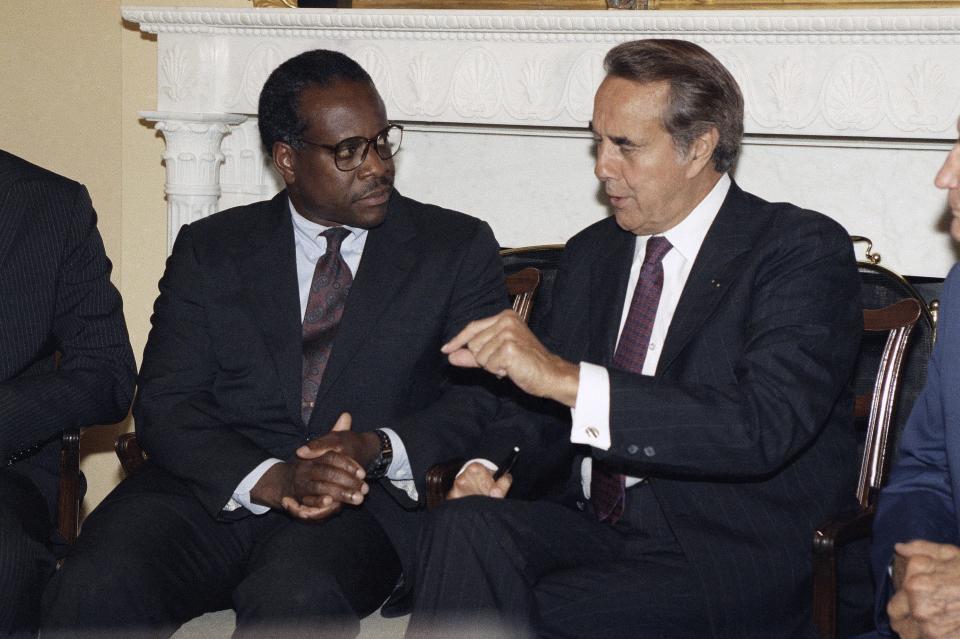
Daniel Coats, (R-Indiana)
Yes: "I do not believe that the (harassment) allegations made against Judge Thomas were adequately substantiated.''
Christopher Dodd, (D-Connecticut)
No: "I was leaning in favor of this nominee but ... I could not rid my own mind of the doubts'' raised by the initial confirmation hearings.
Pete Domenici, (R-New Mexico)
Yes: Early supporter. Thomas "has withstood this and emerged unscathed. How many of us could say the same?''
David Durenberger, (R-Minnesota)
Yes: "I will vote for Clarence Thomas because ... what I know about him is more compelling than the single charge against him.''
James Exon, (D-Nebraska)
Yes: "Both appear believable. ... On Oct. 4, I supported the nomination. ... I intend to vote for confirmation – but without enthusiasm.''
Orrin Hatch, (R-Utah)
Yes: Thomas is a "wonderful, honorable, decent man ... whose life has been really wronged.'' Hill's story "was not credible.''
Mark Hatfield, (R-Oregon)
Yes: The evidence against Thomas is "inconclusive to merit a reversal of (my) earlier support for Judge Thomas.''
Howell Heflin, (D-Alabama)
No: "Our nation deserves the best on the highest court in the land. ... The doubts are too many; the court is too important.''
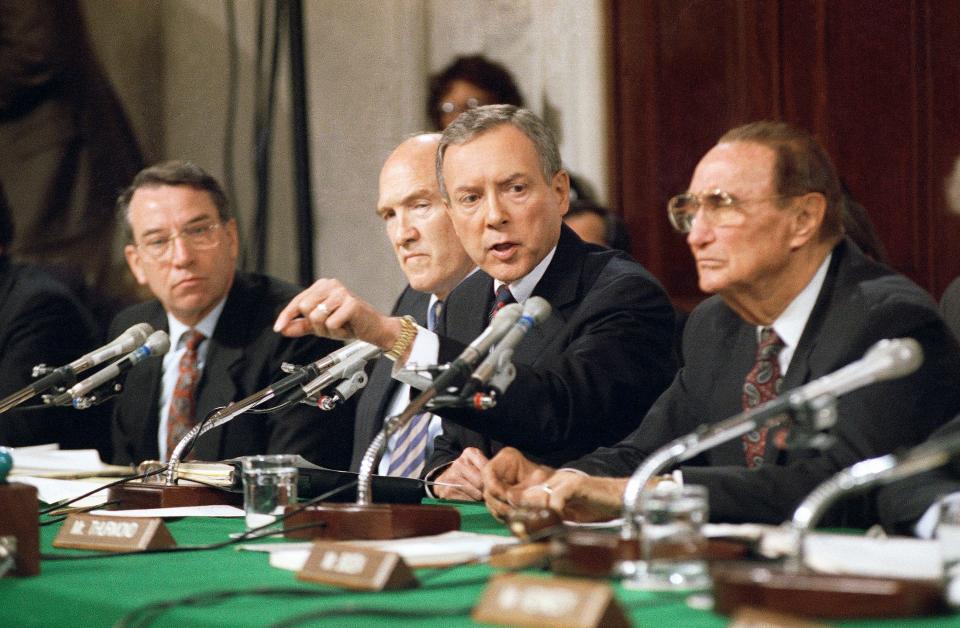
Jesse Helms, (R-North Carolina)
Yes: "The issue is whether (Thomas opponents) want a man who they fear opposes the deliberate destruction of human life.''
Frank Lautenberg, (D-New Jersey)
No: "I do not believe that Judge Thomas would be a dependable guardian of the fundamental rights Americans have come to expect.''
Patrick Leahy, (D-Vermont)
No: "I voted against Judge Thomas because, after reviewing his record and listening to his testimony, I was left with too many questions.''
Carl Levin, (D-Michigan)
No: "I'll vote against because it hasn't been proven that (he) has the judicial temperament to qualify him to sit in highest judgment.''
Joseph Lieberman, (D-Connecticut)
No: "Her (Hill's) testimony was believable. ... I thought I should err on the side of caution.''
Sam Nunn, (D-Georgia)
Yes: Supported Thomas, a fellow Georgian. "He has met the test of intellect, integrity and open-mindedness.''
Bob Packwood, (R-Oregon)
No: "Since I have been left with very little knowledge of what Judge Thomas believes, I decided I will oppose the nomination.''
Claiborne Pell, (D-Rhode Island)
No: "I will vote against Judge Thomas because he is lacking in distinction as a judge and has espoused a curious philosophy.''
Larry Pressler, (R-South Dakota)
Yes: "My vote should not be taken as an indication that I believe either. ... I am voting for Judge Thomas because he's well qualified.''
John Seymour, (R-California)
Yes: "I said before that I was prepared to confirm Judge Thomas. I haven't seen anything that would cause me to change my opinion.''
Richard Shelby, (D-Ala.)
Yes: `"I have been troubled by the allegations, but I made a decision to support Judge Thomas, to give him the benefit of the doubt.''
Paul Simon, (D-Illinois)
No: "This nominee's views are either extreme or unknown. He failed to give answers where there is a serious question of credibility.''
Alan Simpson, (R-Wyoming)
Yes: Excoriated the media and affidavit leaker. "I don't know what more we could have done with the information furnished us.''
Joseph Biden Jr., (D-Deleware)
No: "We are voting on the future of the nation, not the character of the man. ... This is a vote about the future of America.''
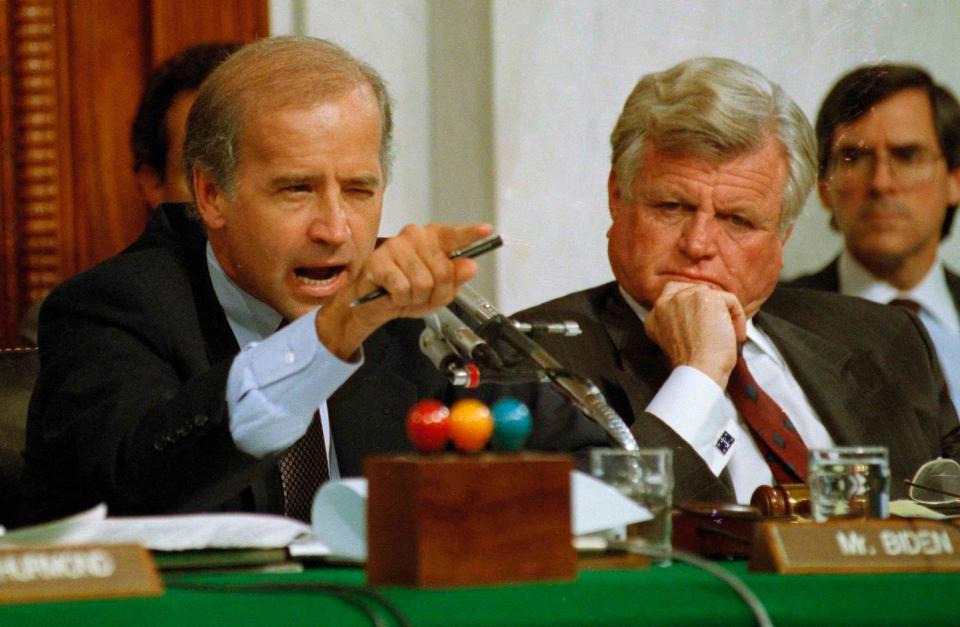
Jeff Bingaman, (D-New Mexico)
No: Previously opposed nomination. "First, he was unqualified; second, I didn't think he'd been forthcoming'' during hearings.
Kit Bond, (R-Missouri)
Yes: "I found serious inconsistencies throughout Ms. Hill's testimony that lead me to conclude ... in favor of Judge Thomas.''
David Boren, (D-Oklahoma)
Yes: Backed Thomas before allegations but agonized on vote. "The accused should be given the benefit of the doubt.''
Thad Cochran, (R-Mississippi)
Yes: "It's a shame we had to see and hear those things. I think it's been kind of a spectacle, really. I don't know if we'll ever know the truth.''
William Cohen, (R-Maine)
Yes: "There was no clear-cut answer; no resolution of the dispute.'' Voted for Thomas despite constituent calls "heavily against him.''
Kent Conrad, (D-North Dakota)
No: Called Thomas, Hill testimony "credible'' but says he "had already determined that I could not support his confirmation.''
Larry Craig, (R-Idaho)
Yes: Wasn't swayed by sexual harassment charges. "I simply do not believe Anita Hill proved her case against Judge Thomas.''
Wendell Ford, (D-Ky.)
No: "There have always been doubts in my mind about his qualifications. ... I didn't want to send a doubt to the court.''
Wyche Fowler Jr., (D-Georgia)
Yes: "Dispassionate analysis of the charges was impossible,'' but "there was nothing to prove the charges'' against Thomas.
Jake Garn, (R-Utah)
Yes: "My commitment to ... Clarence Thomas is as strong as it was before. I think this was part of a conspiracy by the Democrats.''
John Glenn, (D-Ohio)
No: "Judge Thomas has had relatively little experience on the bench. ... I cannot in clear conscience support'' his nomination to the court.
Ernest Hollings, (D-South Carolina)
Yes: It comes down to the president's right to appoint a conservative to the Supreme Court. "That was the bottom line for me.''
Daniel Inouye, (D-Hawaii)
No: An early opponent who said in a statement before vote: "I have too many questions and too many doubts'' about Thomas.
James Jeffords, (R-Vermont)
No: Reiterated his early opposition by saying: "I find Judge Thomas' record to be troubling and I cannot simply discount it.''
J. Bennett Johnston, (D-Louisiana.)
Yes: "I believe Judge Thomas is qualified. I said so two weeks ago. Nothing has transpired in the meantime to take away from that.''
Trent Lott, (R-Mississippi)
Yes: "I looked at the man's background and I am impressed. He has the character necessary to serve on the Supreme Court.''
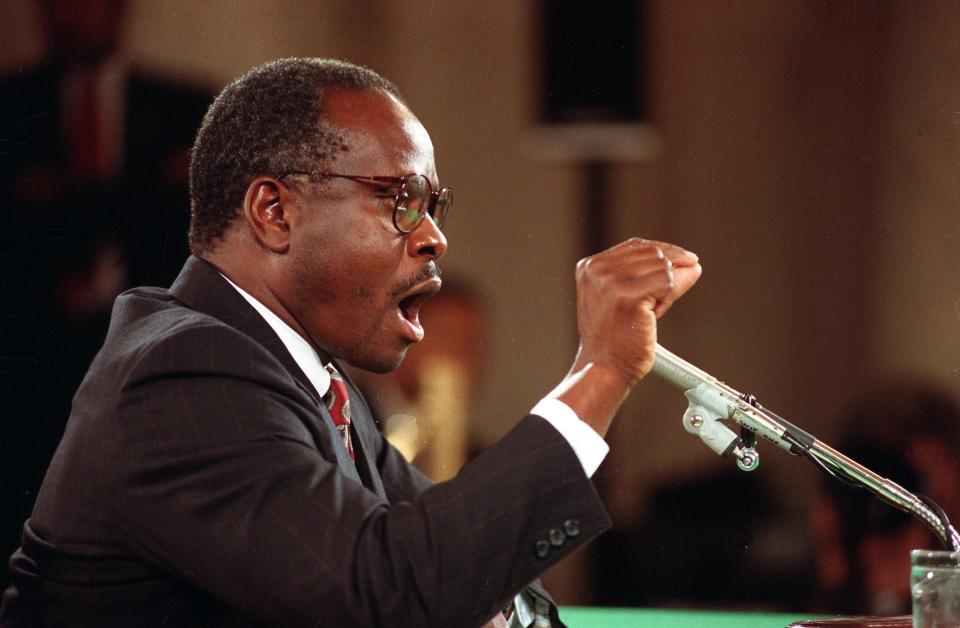
Richard Lugar, (R-Indiana)
Yes: "They (Democratic staffers) finally uncovered a witness in Professor Hill who made serious charges. I think that strategy failed.''
Connie Mack, (R-Florida)
Yes: It's "one person's word against the other's. I intend to support President Bush's nominee, Clarence Thomas. I don't believe Anita Hill.''
John McCain, (R-Arizona)
Yes: "With regard to the allegations made by Professor Hill, the case simply has not been made against the ... confirmation.''
David Pryor, (D-Arkansas)
No: "I felt Mr. Thomas' tenure as head of the EEOC raised serious questions about his qualifications for higher office.''
Harry Reid, (D-Nevada)
No: Said he could not vote for Thomas. "The last thing I did before I decided was to call my wife. I believe Anita Hill was telling the truth.''
Donald Riegle, (D-Michigan)
No: "I cannot find a single distinguishing aspect in Mr. Thomas' legal career that would warrant his consideration for the court.''
Charles Robb, (D-Virginia)
Yes: Hearings "did not change my instincts'' about Thomas, who he said would not bring a "specific ideological agenda'' to the court.
Robert Smith, (R-New Hampshire)
Yes: Believes Thomas will interpret law rather than make it – an approach he agrees with. Hearings had no effect on Smith's support.
Arlen Specter, (R-Pennsylvania)
Yes: "What's at stake here is credibility. In my judgment, the weight of the evidence supports Clarence Thomas.''
Ted Stevens, (R-Alaska)
Yes: Sen. Danforth "convinced me some time ago that Thomas is an outstanding man. ... I saw no reason not to support him again.''
Steve Symms, (R-Idaho)
Yes: Hearings a "true test'' of Thomas' character. "His fortitude in the face of this inquisition convinces me of his fitness for service.''
Bill Bradley, (D-New Jersey)
No: Offended by the "way the men in the White House chose to wage battle.'' Strategy to discredit Hill "ultimate in sexual stereotyping.''
John Breaux, (D-Louisiana)
Yes: "I have been impressed with the women who knew Judge Thomas as a colleague (and) testified he never exhibited sexual harassment.''
Hank Brown, (R-Colorado)
Yes: "The proof that (Thomas) did this thing is simply not there. At this point, the case for this very serious charge hasn't been made.''
Richard Bryan, (D-Nevada)
No: Was one of the first senators to declare he would withdraw support for Thomas unless vote was delayed to investigate allegations.
Alan Cranston, (D-California)
No: "I found myself doubting Judge Thomas' veracity. A man should not be on the U.S. Supreme Court with doubts about his truthfulness.''
Alfonse D'Amato, (R-New York)
Yes: "I believe that the professor was used. I believe that there are serious doubts as to the validity of the claims, as serious as they are.''
John Danforth, (R-Missouri)
Yes: "I believe Clarence Thomas. He is an enormously strong person who has endured what no one should ever endure.''
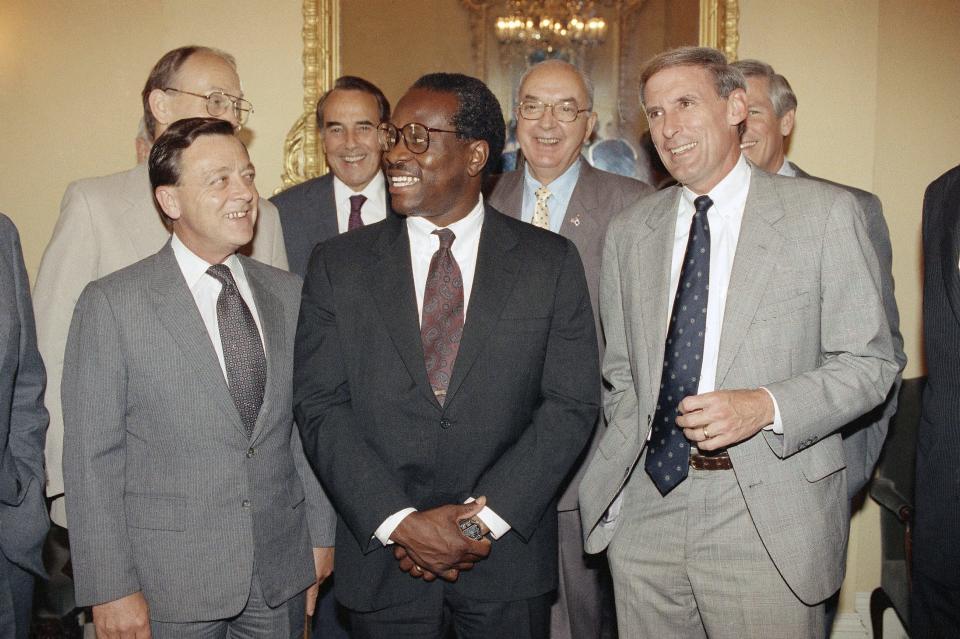
Thomas Daschle, (D-South Dakota)
No: Prior decision to vote against Thomas because "he wasn't qualified.'' Was not swayed by the sexual harassment allegation.
Albert Gore Jr., (D-Tennessee)
No: "Judge Thomas said he had no conversation with any individual about Roe vs. Wade,'' the abortion ruling. "Is that credible?''
Slade Gorton, (R-Washington)
Yes: "I doubt any of us will ever know the truth'' but "I cannot deny him that position on suspicion alone, no matter how troubling.''
Bob Graham, (D-Florida)
No: Presumed "correctness'' of president's pick, but accepts "factual statement of the circumstances'' presented by Hill.
Phil Gramm, (R-Texas)
Yes: "The people who voted for George Bush have every reason to expect he would appoint conservatives to the Supreme Court.''
Nancy Kassebaum, (R-Kansas)
Yes: Chided "witch hunt'' against Hill, but Thomas "deserved better than we can now give him.'' Found no reason to withdraw support.
Robert Kasten, (R-Wisconsin)
Yes: "The charges against Clarence Thomas were very serious, but I am simply not convinced that they are true.''
Edward Kennedy, (D-Massachusetts)
No: "The Senate should give the benefit of the doubt to the Supreme Court and to the American people, not to Thomas.''
Bob Kerrey, (D-Nebraska)
No: Presidential candidate said Thomas possibly "did something that might have been interpreted as sexual harassment.''
Mitch McConnell, (R-Kentucky)
Yes: "Denying confirmation based on an unproven allegation would be contrary to American principles.''
Howard Metzenbaum, (D-Ohio)
No: Wanted to believe Thomas, "but when I heard Anita Hill I found myself unable to believe she was not telling the truth.''
Barbara Mikulski, (D-Maryland)
No: "What we saw was not a hearing but an inquisition.'' Hill, "who had the courage to stand up and say 'no,' is being victimized.''
Daniel Moynihan, (D-New York)
No: Switched vote. Asked why, said he didn't want "to say anything that in the least way would follow Judge Thomas to the court.''
Jay Rockefeller, (D-West Virginia)
No: "Judge Thomas' appointment is a retreat from excellence, another triumph of mediocrity, engineered by George Bush.''
William Roth, (R-Deleware)
Yes: "It is time to put an intelligent and judicious individual in a most venerable position.''
Warren Rudman, (R-New Hampshire)
Yes: "While he is not as experienced as some past nominees, Judge Clarence Thomas is qualified to take a seat on the Supreme Court.''
Terry Sanford, (D-North Carolina)
No: "I have listened to his testimony and read his articles and I have found him wanting. His testimony was less than convincing.''
Strom Thurmond, (R-South Carolina)
Yes: "I do not believe Judge Thomas is capable of the kind of behavior Professor Hill described. ... I think the judge has been vindicated.''
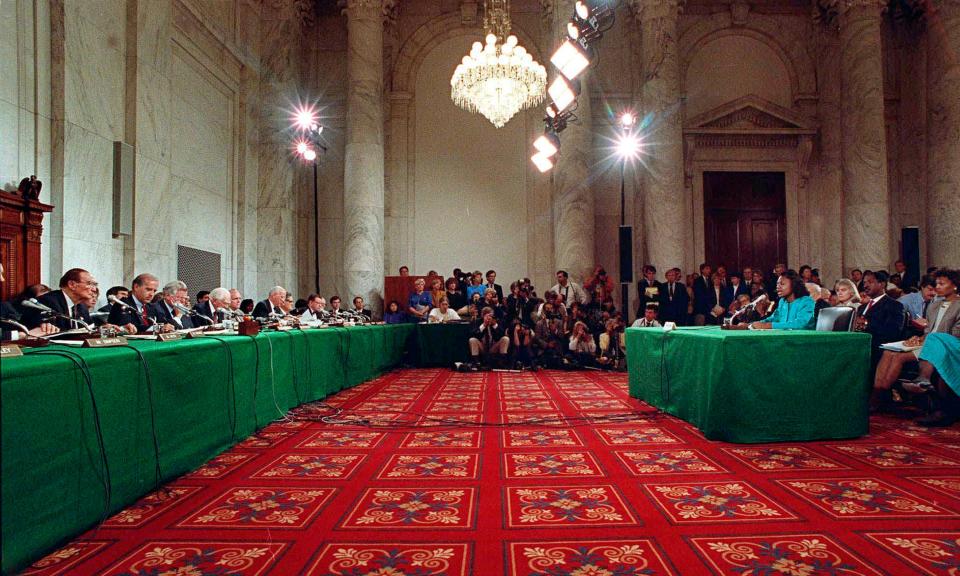
Malcolm Wallop, (R-Wyoming)
Yes: "If you can derail one person's access to higher office without providing proof, then there's no case for finding competent people.''
John Warner, (R-Virginia)
Yes: "Judge Thomas is the president's choice.'' Second hearing was not "a clear basis on which to decide who's truthful and who's not.''
Paul Wellstone, (D-Minnesota)
No: Opposition to Thomas was unchanged. "I cannot support a nominee who says he or she has no articulable views.''
Dale Bumpers, (D-Arkansas)
No: Opposed before harassment allegations surfaced and, therefore, says he did not "judge the truth or falsity of these late allegations.''
Quentin Burdick, (D-North Dakota)
No: Had already opposed the Thomas nomination so wasn't swayed by weekend hearings airing the sexual harassment allegations.
Dennis DeConcini, (D-Arizona)
Yes: "There is not sufficient evidence (of harassment). ... It's inconclusive. The whole process (didn't) change my support.''
Alan Dixon, (D-Illinois)
Yes: "Judge Thomas is entitled to a presumption of innocence. The committee hearings did not overcome that presumption.''
Charles Grassley, (R-Iowa)
Yes: "I have decided to continue my support'' of Thomas. "I sat through every hour. ... Hill's story just doesn't add up.''
Tom Harkin, (D-Iowa)
No: Presidential candidate said Thomas failed to show "unequivocal'' support for individual rights. Hearings "deepened my doubts.''
John Kerry, (D-Massachusetts)
No: "You cannot ignore the weight of (Hill's) testimony. Part of this story is untold, but that does not contradict ... what may have happened.''
Herbert Kohl, (D-Wisconsin)
No: "He is not qualified. There is ... the possibility we may be placing on the Supreme Court someone who has committed perjury.''
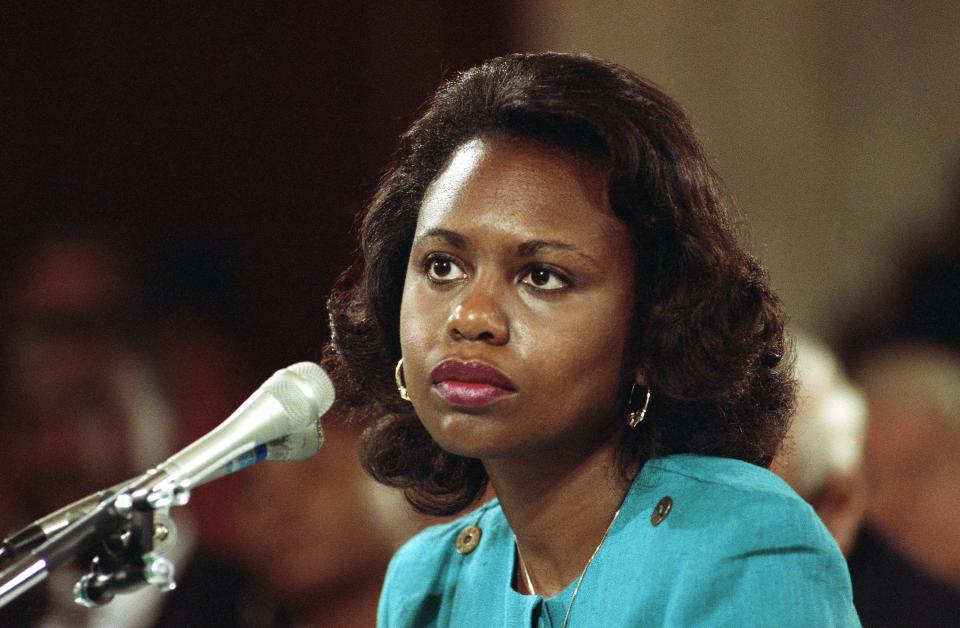
Frank Murkowski, (R-Alaska)
Yes: "The goal seems to be to win at all costs. Fairness dictates that the substantial doubt that exists be resolved in favor of Judge Thomas.''
Don Nickles, (R-Oklahoma)
Yes: "I resolved to keep an open mind. After listening to all the witnesses, I found the charges were not proven.''
Paul Sarbanes, (D-Maryland)
No: Had "many unanswered questions, ... serious doubts'' about his judicial stance. It's "too important a position to base upon hope.''
Jim Sasser, (D-Tennessee)
No: "There are doubts about the nominee's legal experience, his legal maturity, his legal theory, and now, sadly, his character.''
Timothy Wirth, (D-Colorado)
No: "The primary reason I cannot vote to confirm Thomas is his ambiguous stand on the right to privacy and reproductive freedom.''
Harris Wofford, (D-Pennsylvania)
No: He was "especially disappointed to witness a confirmation process which, from the outset, elevated politics over qualifications.''
This article originally appeared on USA TODAY: Senators discuss confirmed Supreme Court Justice Clarence Thomas

